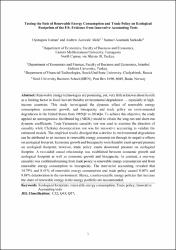| dc.contributor.author | Usman, Ojonugwa | |
| dc.contributor.author | Alola, Andrew Adewale | |
| dc.contributor.author | Sarkodie, Samuel Asumadu | |
| dc.date.accessioned | 2020-05-18T21:14:41Z | |
| dc.date.available | 2020-05-18T21:14:41Z | |
| dc.date.issued | 2020 | en_US |
| dc.identifier.issn | 0960-1481 | |
| dc.identifier.uri | https://hdl.handle.net/11363/2149 | |
| dc.description | Document Information
Language:English
Accession Number: WOS:000518874500023 | en_US |
| dc.description.abstract | Renewable energy technologies are promising, yet, very little is known about its role as a limiting factor in fossil fuel-attributable environmental degradation - especially in high-income countries. This study investigated the dynamic effect of renewable energy consumption, economic growth, biocapacity and trade policy on environmental degradation in the United States from 1985Q1 to 2014Q4. To achieve this objective, the study applied an autoregressive distributed lag (ARDL) model to obtain the long-run and short-run dynamic coefficients. Toda-Yamamoto causality test was used to examine the direction of causality while Cholesky decomposition test was for innovative accounting to validate the estimated models. The empirical results divulged that a decline in environmental degradation can be attributed to an increase in renewable energy consumption through its negative effects on ecological footprint. Economic growth and biocapacity were found to exert upward pressure on ecological footprint; however, trade policy exerts downward pressure on ecological footprint. A two-sided causal relationship was established between economic growth and ecological footprint as well as economic growth and biocapacity. In contrast, a one-way causality was confirmed running from trade policy to renewable energy consumption and from renewable energy consumption to biocapacity. The innovative accounting revealed that 14.79% and 8.41% of renewable energy consumption and trade policy caused 0.60% and 9.88% deterioration in the environment. Hence, country-specific energy policies that increase the share of renewable energy in the energy portfolio are recommended. | en_US |
| dc.description.sponsorship | S.A.S acknowledges the financial support of Nord University Business School. | en_US |
| dc.language.iso | eng | en_US |
| dc.publisher | PERGAMON-ELSEVIER SCIENCE LTD, THE BOULEVARD, LANGFORD LANE, KIDLINGTON, OXFORD OX5 1GB, ENGLAND | en_US |
| dc.relation.isversionof | 10.1016/j.renene.2019.12.151 | en_US |
| dc.rights | info:eu-repo/semantics/openAccess | en_US |
| dc.rights | Attribution-NonCommercial-NoDerivs 3.0 United States | * |
| dc.rights.uri | http://creativecommons.org/licenses/by-nc-nd/3.0/us/ | * |
| dc.subject | Ecological footprint | en_US |
| dc.subject | Renewable energy consumption | en_US |
| dc.subject | Trade policy | en_US |
| dc.subject | Innovation accounting tests | en_US |
| dc.subject | KUZNETS CURVE HYPOTHESIS | en_US |
| dc.subject | EMPIRICAL-EVIDENCE | en_US |
| dc.subject | CO2 EMISSIONS | en_US |
| dc.subject | COINTEGRATION | en_US |
| dc.subject | Tourism | en_US |
| dc.subject | INCOME | en_US |
| dc.subject | SOCIAL SCIENCES | en_US |
| dc.title | Assessment of the role of renewable energy consumption and trade policy on environmental degradation using innovation accounting: Evidence from the US | en_US |
| dc.type | article | en_US |
| dc.relation.ispartof | RENEWABLE ENERGY | en_US |
| dc.department | İktisadi İdari ve Sosyal Bilimler Fakültesi | en_US |
| dc.identifier.volume | 150 | en_US |
| dc.identifier.startpage | 266 | en_US |
| dc.identifier.endpage | 277 | en_US |
| dc.relation.publicationcategory | Makale - Uluslararası Hakemli Dergi - Kurum Öğretim Elemanı | en_US |



















